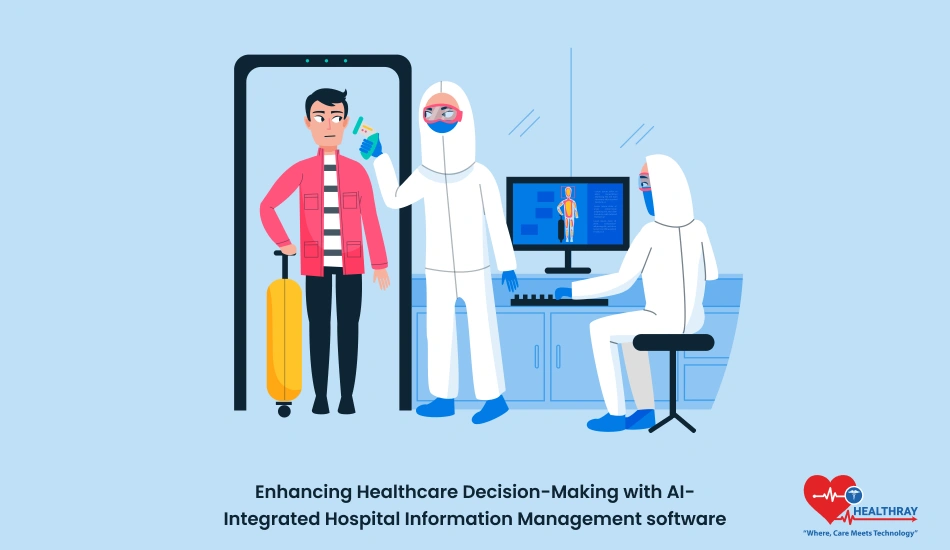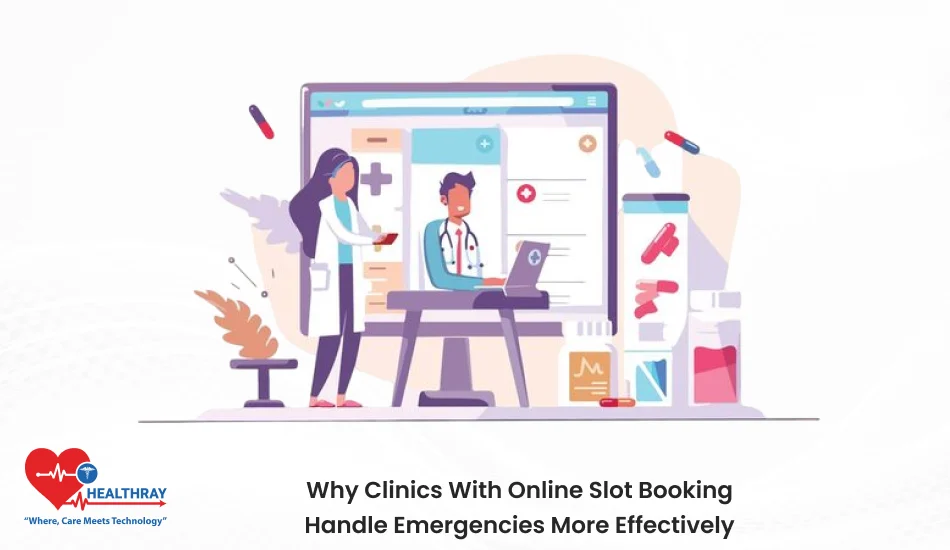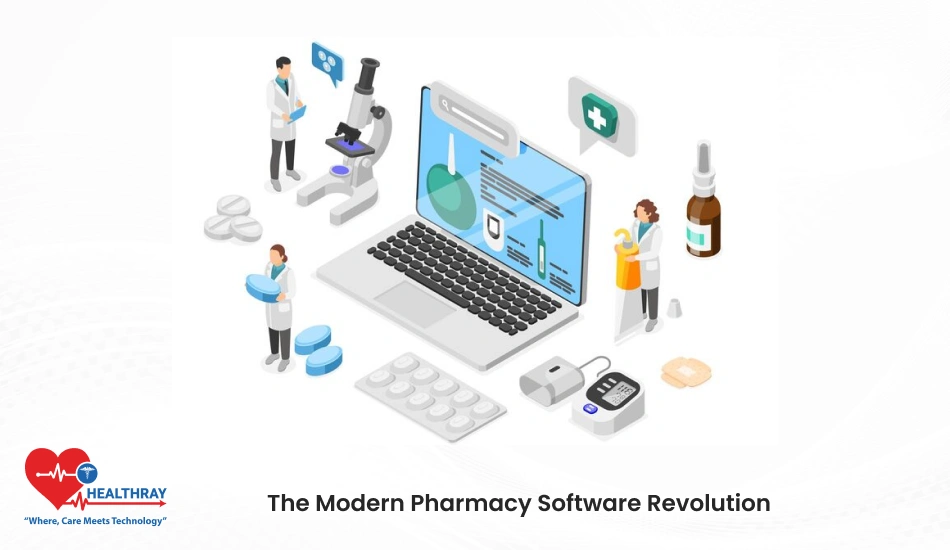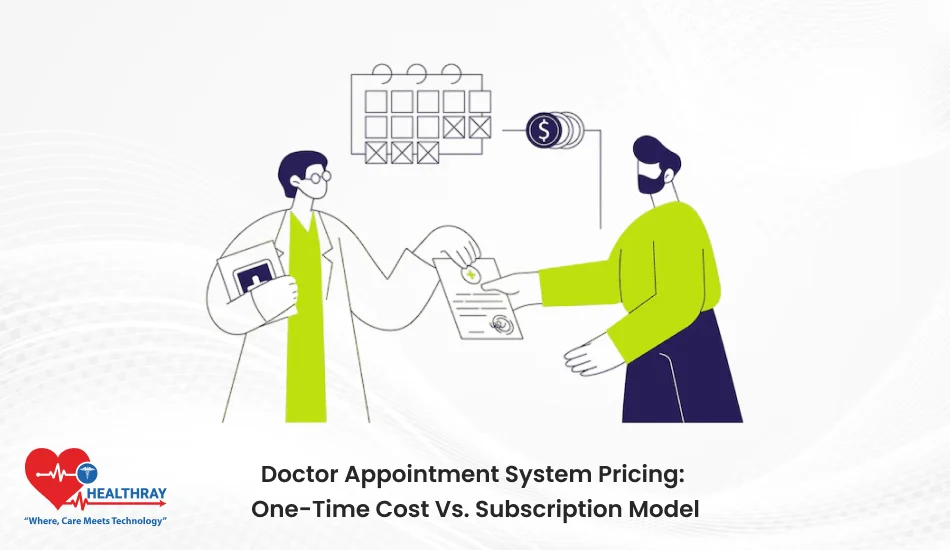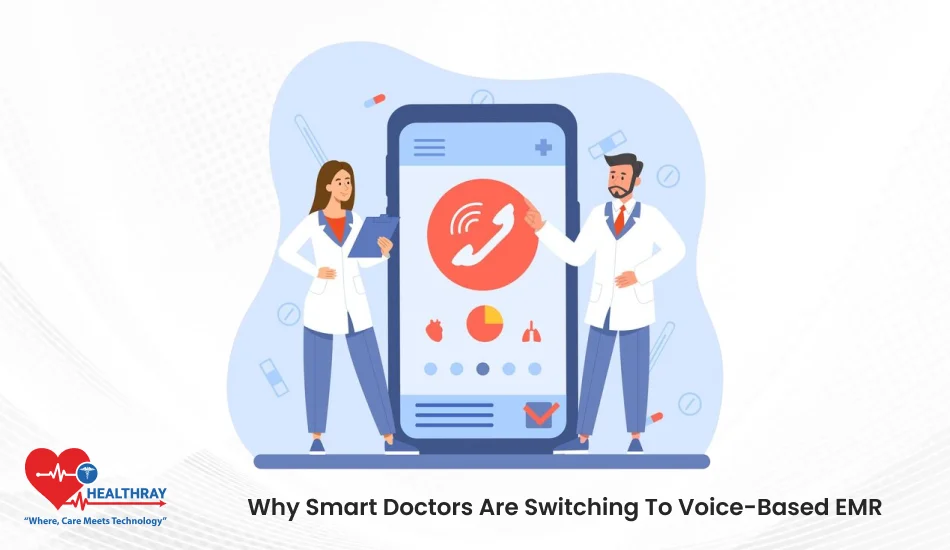The core of the hospital is based on making critical decisions, as every choice impacts patient care, efficiency in operations, and outcomes. With the vast amount of data generated each day, decision-making becomes more complex. This is where AI-integrated Hospital Information Management System (HIMS) take center stage and revolutionize healthcare by converting data into actionable insights.
AI integration allows healthcare professionals to analyze patient trends, predict outcomes, and automate repetitive tasks. These capabilities not only streamline operations but also improve patient care and satisfaction. In this post, we’ll explore how AI-powered systems enhance decision-making in hospitals, why they are becoming indispensable, and what administrators and healthcare IT managers need to know before implementing them.
Benefits of AI-Integrated Hospital Information Management Systems
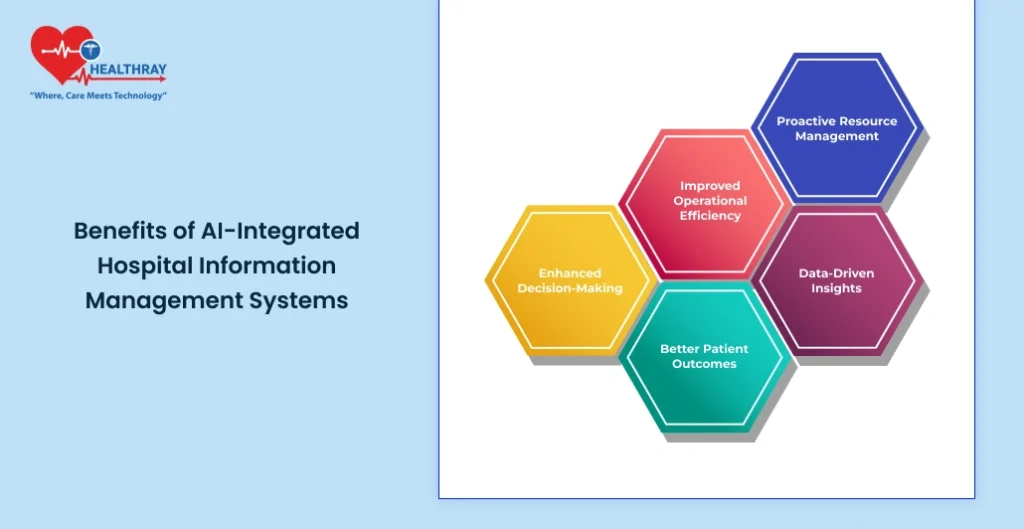
Enhanced Decision-Making
AI-powered systems scan large amounts of data in real-time to identify patterns and trends the human eye may not observe. For example, this tool can identify surges in patient admissions beforehand, enabling better planning of resource allocation. A clinical decision support system presents real-time recommendations that can inform healthcare professionals to reach the best evidence-based decision, thereby improving patient outcome.
Improved Operational Efficiency
Hospitals manage over a thousand tasks on a daily basis, ranging from patient planning to inventory tracking. AI automates repetitive administrative works like scheduling appointments, billing staff, and allocating staff. Due to this, the human working force is less burdened; therefore, there is less room for errors. This leads to smooth operations and substantial cost benefits to healthcare facilities.
Better Patient Outcomes
AI-based tools can provide personalized care through learning the patient histories and current conditions. Predictive analytics can detect diseases long before they actually occur and, therefore, provide insights through machine learning models on tailored treatment plans. The precision will result in quick recovery and a more satisfied patient.
Data-Driven Insights
AI transforms raw data into actionable insights for hospital information systems. Using these systems, bed occupation rate, patient waiting times, and resource utilization will all be visible to administrators as well as IT managers of a hospital. Data-backed decisions in this manner help bring better efficiency and quality service.
Proactive Resource Management
AI predicts resource demands, ensuring that there is always preparation for variations in the needs of the patients in hospitals. In case of a seasonal flu peak, AI can examine historical data to predict bed supply, staff requirements, and medication stock.
Implementation Strategies for AI-Integrated Hospital Information Management Systems
Assess Current Systems and Needs
The hospitals need to review the existing systems before implementing AI. It means identifying areas to be improved, for example, the inefficiency of patient data management or distribution of resources, then creating goals for the AI integration. This knowledge about deficiencies leads to the selection of relevant AI tools that are in line with the needs of the hospitals.
Select the Right AI Tools
Not all AI solutions are one size fits all. Hospitals must choose the best tools for them. If managing patient data is what needs attention, then AI can assist electronic health records (EHRs) to make data sharing easier. When selecting software, leaders must seek software that integrates smoothly with what they already have without expensive replacement of those systems.
Ensure Data Security and Compliance
Of course, deploying AI involves significant interaction with tremendous amounts of highly sensitive patient data. This will inevitably mean that for every hospital, it is a need to comply to a set of regulations applicable for the healthcare industry. Different places have their specific needs like HIPAA or GDPR, respectively. The following are controls for patient data protection: Encryption, access control, and security auditing.
Train and Upskill Staff
AI systems are only as good as the people using them. Training needs to be technical in its skill and enlightened to appreciate the value of the use of AI tools. Continuous training in hands-on workshops would facilitate gradual introduction, allowing confidence in the new systems being applied.
Pilot and Scale Gradually
Implementation of AI in hospitals is a huge shift. It would be a smart way to start with small pilots like one department or process; here, there are administrators who can clearly identify different types of difficulty and address those before all AI solutions across their business come completely.
Collaborate with Stakeholders
It affects every level in the operations of a hospital. Stakeholders, including administrators, IT managers, and clinical staff, as well as even patients, should be involved in the planning and implementation process to ensure smoother rollouts. Their insights could refine strategies and increase buy-in.
Case Studies: Successful AI Integration in Hospitals
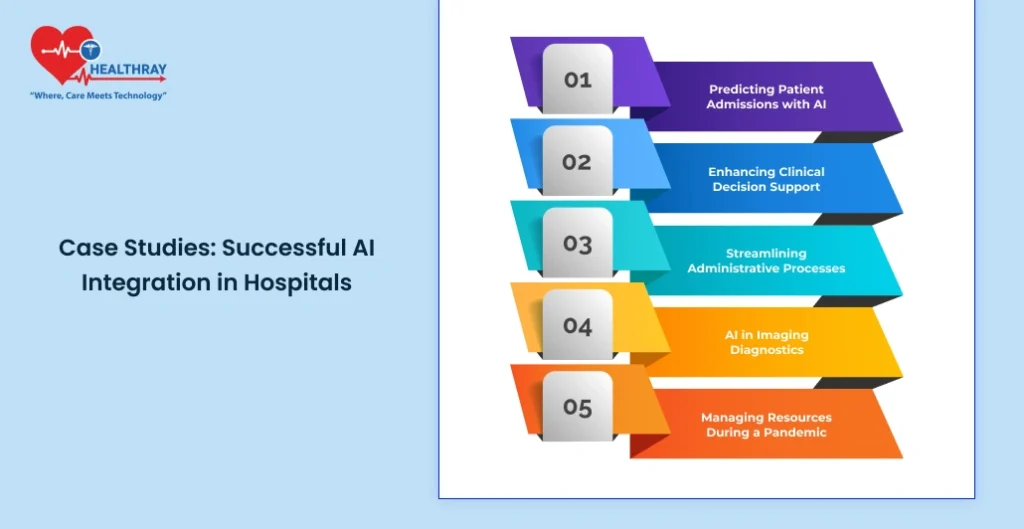
Predicting Patient Admissions with AI
Based on AI, it will analyze historical data of patients together with external factors including weather patterns and trends for diseases for predicting patient admission. Thus, organizations get the benefits with the reduction in wait time that eventually impacts the rate of patient satisfaction.
Enhancing Clinical Decision Support
AI-integrated Clinical Decision Support Systems analyze patient records, lab results, and medical literature to help healthcare providers make real-time treatment recommendations. This has been proven to minimize the occurrences of diagnostic errors and ensure faster and more accurate treatment.
Streamlining Administrative Processes
In most hospitals, AI is integrated with HIMS Software. It has streamlined the whole process from scheduling appointments to billing and generating discharge summaries. The whole administrative load is minimized while maximizing chances of errorless billing. This reduces all administrative activities to a large extent, giving greater focus to the care of patients.
AI in Imaging Diagnostics
If applied to X-rays and MRIs, the AI-based image recognition technology helps identify abnormalities with accuracy. It quickly diagnoses conditions for the radiologists, which can lead to rapid diagnosis and reduce the burden on the radiology departments.
Managing Resources During a Pandemic
With AI, the hospitals now predict health resource needs like oxygen and ICU beds, especially during this time of crisis like that of COVID-19. AI helps the hospitals monitor the patient’s vitals and historical data and dynamically allocate resources to continuously care for the patients even in times of stress.
Challenges and Solutions in AI Integration for Hospital Information Management
Data Security and Privacy Concerns
Challenge: Handling sensitive patient information is a critical concern. AI systems often require vast amounts of data, raising the risk of breaches and non-compliance with regulations like HIPAA or GDPR.
Solution: Hospitals can address this by implementing robust encryption, multi-factor authentication, and regular security audits. Partnering with vendors experienced in healthcare compliance ensures that systems meet legal standards from the start.
High Implementation Costs
Challenge: AI integration often involves significant upfront investment in software, hardware, and training. This can be a barrier for smaller healthcare organizations.
Solution: Hospitals can explore phased implementation, starting with pilot projects to demonstrate ROI. Leveraging cloud-based AI solutions can also reduce infrastructure costs.
Resistance to Change
Challenge: Staff may resist adopting AI systems due to fear of job displacement or unfamiliarity with new technologies.
Solution: Clear communication about the benefits of AI and how it supports rather than replaces staff roles is essential. Providing hands-on training and continuous support helps staff adapt and feel confident using AI tools.
Integration with Legacy Systems
Challenge: Many hospitals still rely on legacy systems that may not seamlessly integrate with AI technologies, leading to inefficiencies.
Solution: Hospitals should work with vendors who offer customizable AI solutions designed to integrate with existing infrastructure. Conducting a system compatibility assessment before implementation can prevent technical challenges.
Ensuring Accuracy and Reliability
Challenge: AI tools rely on the quality of data they are fed. Incomplete or biased data can lead to errors in decision-making.
Solution: Regularly updating and validating data sets is critical. Hospitals should establish protocols for human oversight to review AI-generated recommendations before acting on them.
Ethical Concerns
Challenge: Using AI for decision-making raises ethical questions, such as the fairness of algorithms and potential biases.
Solution: Hospitals must adopt transparent AI systems where decision-making processes are explainable. Collaborating with ethicists and regulatory bodies ensures adherence to ethical guidelines.
Future Trends in AI-Integrated Hospital Information Management Systems
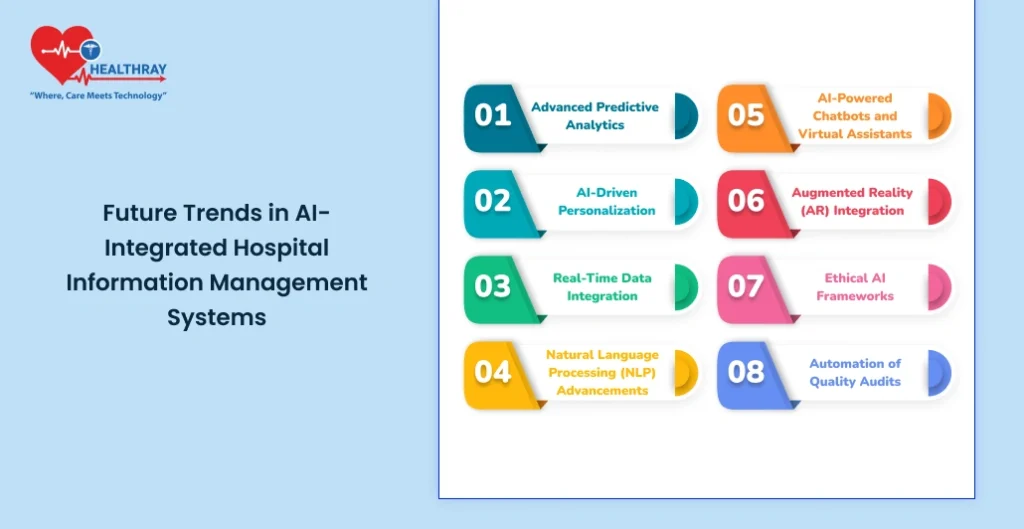
Advanced Predictive Analytics
The future of health information management will see AI systems becoming even more sophisticated in predicting patient needs. With enhanced machine learning algorithms, hospitals can anticipate not just admission surges but also specific care requirements, enabling better resource planning and patient outcomes.
AI-Driven Personalization
As AI technologies evolve, hospital systems will be able to offer highly personalized patient care. Tools that analyze individual health records, genetic data, and lifestyle factors will provide tailored treatment plans, ensuring precision medicine becomes the norm.
Real-Time Data Integration
AI-powered systems are expected to improve in aggregating real-time data from multiple sources, such as wearable devices, IoT-enabled medical equipment, and EHRs. This seamless integration will offer a 360-degree view of patient health, allowing for immediate and informed decision-making.
Natural Language Processing (NLP) Advancements
NLP technologies will likely play a larger role in hospital management, helping to transcribe and analyze unstructured data like doctor’s notes, emails, and patient feedback. This will improve communication, reduce documentation errors, and enhance overall efficiency.
AI-Powered Chatbots and Virtual Assistants
Future hospital systems will increasingly leverage AI chatbots for administrative tasks and patient interaction. These tools will handle appointment scheduling, answer patient queries, and provide follow-up care instructions, reducing the burden on human staff.
Augmented Reality (AR) Integration
AI combined with AR is poised to revolutionize surgical planning and training. Surgeons could use AR systems powered by AI to simulate surgeries, analyze patient anatomy, and perform precise interventions with real-time guidance.
Ethical AI Frameworks
As reliance on AI grows, hospitals will adopt more robust ethical frameworks to ensure unbiased decision-making and compliance with regulations. Transparent algorithms and explainable AI will be critical to gaining the trust of both staff and patients.
Automation of Quality Audits
AI systems will automate quality assurance processes, such as monitoring patient care standards and regulatory compliance. Automated audits will allow hospitals to identify and address gaps more efficiently.
Conclusion
Hospital Management System and hospital information management systems- integration of AI more than a technical update it’s an evolution into much more efficient, patient-centric care.
From predictive analytics that optimize resource allocation to personalized care plans that improve outcomes, AI is changing the way hospitals work. Hospital administrators, healthcare IT managers, and decision-makers must understand and leverage the potential of AI. Challenges such as data security and high costs notwithstanding, strategic planning and phased implementation can make AI integration achievable and rewarding.
As demands in the healthcare sector grow, embracing AI in Hospital Management Systems is no longer an option but rather the future of efficient hospital management and enhanced patient care.
